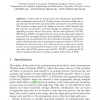Free Online Productivity Tools
i2Speak
i2Symbol
i2OCR
iTex2Img
iWeb2Print
iWeb2Shot
i2Type
iPdf2Split
iPdf2Merge
i2Bopomofo
i2Arabic
i2Style
i2Image
i2PDF
iLatex2Rtf
Sci2ools
ALGOSENSORS
2008
Springer
2008
Springer
Probabilistic Protocols for Fair Communication in Wireless Sensor Networks
In this work we present three new distributed, probabilistic data propagation protocols for Wireless Sensor Networks which aim at maximizing the network's operational life and improve its performance. The keystone of these protocols' design is fairness which declares that fair portions of network's work load should be assigned to each node, depending on their role in the system. All the three protocols, EFPFR, MPFR and TWIST, emerged from the study of the rigorously analyzed protocol PFR. Its design elements were identified and improvements were suggested and incorporated into the introduced protocols. The experiments conducted show that our proposals manage to improve PFR's performance in terms of success rate, total amount of energy saved, number of alive sensors and standard deviation of the energy left. Indicatively we note that while PFR's success rate is 69.5%, TWIST is achieving 97.5% and its standard deviation of energy is almost half of that of PFR.
ALGOSENSORS 2008 | Data Propagation Protocols | PFR's Success Rate | Sensor Networks | Standard Deviation |
Related Content
| Added | 12 Oct 2010 |
| Updated | 12 Oct 2010 |
| Type | Conference |
| Year | 2008 |
| Where | ALGOSENSORS |
| Authors | Ioannis Chatzigiannakis, Lefteris M. Kirousis, Thodoris Stratiotis |
Comments (0)

